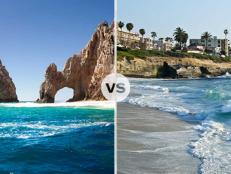Time-Shares
Consider a time-share vacation as a family travel alternative.

For folks who have been on the receiving end of an unsolicited sales pitch, the phrases "time-share vacation" or "You've been selected for a free Caribbean getaway" are likely to raise a red flag.
In reality, you can distance yourself from the concept of time-shares as a tactic for corporations to cash in on your vacation fantasies -- a practice that's largely a thing of the past -- thanks to self-regulating measures in the industry, and know there are good reasons to consider buying into a vacation time-share in destinations as diverse as Fiji, New Zealand, St. Lucia and France.
"When you buy a time-share unit, you are essentially buying a financial hedge against vacation inflation, or the rising cost of hotel rooms," wrote Kim Kavin in her book The Everything Family Guide to Timeshares, an easy-to-follow and comprehensive resource for individuals considering buying a time-share for the first time.
The first thing to know about buying a time-share is that it is not the same as investing in traditional real estate.
Your benefit as a buyer comes not in the property's appreciating value over time, but in the fact that every year, for a rate that's fixed when you buy in, you are guaranteed a week or more of vacation time in pretty much your choice of destinations.
Time-share owners can vacation in the same location year after year, or exchange their week(s) for time-shares in other destinations around the world. Time-shares can also be purchased in 2-year and even 3-year increments.
And for travelers who spend hundreds, even thousands of dollars a year on hotel rooms, the opportunity to cut costs over time is just 1 of the benefits of time-share ownership.
Time-share units often come with amenities that most hotel rooms don't offer, such as multiple rooms and kitchen facilities, adding a homier dimension to your vacation.
And in many cases, when you buy a time-share, you also have the option of converting an unused week into points redeemable for cruise vacations, car rentals and even airfare (conversion fees almost always apply).
Perhaps one of the biggest perks for time-share owners, however, is something less tangible. In our overworked society, committing to a timeshare can essentially force you to use your vacation time. After all, you've already paid for your family's vacation -- so there's no excuse not to take it.
"The US traveler is figuring out there's no better way to travel," said Jason Tremblay, CEO of SellMyTimeshareNow.com, a time-share resale company representing properties in more than 120 countries.
"Rather than taking the family down to Orlando and cramming them all into a hotel room with limited amenities, for a very small price you can purchase a time-share or even rent 1 from an existing owner," Tremblay said, "And the onsite amenities can be extraordinary -- some of these resorts even have movie theaters and water parks."
With some 8 million time-share owners invested in more than 5,000 timeshare resorts around the world, the options for where to take your time-share vacation are pretty much endless.
The Disney Vacation Club is a time-share program that allows owners to stay at not only 8 official Disney Vacation Club resorts (including 6 properties at Disney World in Orlando, and Disney-owned properties in Vero Beach, FL, and Hilton Head, SC), but more than 500 worldwide properties, too, in destinations as diverse as London, Hawaii and Lake Tahoe. Unlike the traditional weekly model, Disney Vacation Club members can stay in one of the resorts for as little as 1 night, and take multiple vacations throughout the year.
And when it comes to time-share amenities, you'll find every angle covered.
Among the perks available to time-share owners at The Ridge Tahoe in Stateline, NV, for example, are fireplaces in every unit, racquetball, badminton and tennis courts and a private gondola for shuttling guests directly to Heavenly Ski Resort.
Still skeptical?
To be sure, there are relentless salesmen out there who will try to bully you into signing a contract after enticing you to Aruba or elsewhere with a free vacation. But if you're interested in buying a time-share and you do your research ahead of time, ask the right questions along the way and read all the fine print before signing on the dotted line, chances are you won't get scammed.
"What's happened over the last 10 years is you've had a lot of the major brands -- Marriott, Hilton, Hyatt and Disney -- come into the time-share market," said Tremblay, "And they've legitimized the industry in many ways."
.
Be aware that in addition to the initial outlay of cash to purchase your time-share, you'll also be responsible for annual maintenance fees ranging from roughly $200 to $600. Other hidden costs can include 1-time fees for capital improvements, exchange company fees incurred when you exchange your week for another week, and conversion fees should you choose to convert your week into points for a cruise, airline miles and the like. For time-share owners who opt to finance their purchase, mortgage interest payments can also come into play.
For a general idea of what you can expect to pay for a time-share, the average price when purchasing from a developer is around $18,000. But location has everything to do with price, and the scale can range anywhere from $4,000 to $5,000 for a time-share in Orlando to $40,000 for a property in Hawaii.
The resale market (buying directly from time-share owners who are looking to opt out of their contracts) is a significantly more cost-effective way to get in. It's interesting to note that despite economic woes of late, the timeshare industry has seen a substantial increase in the buyer market during recent years.
"Instead of buying a deeded vacation home, with all the upkeep that comes along with it," said Tremblay, "a lot of people are looking at time-shares as a more affordable way to own a vacation property."



























.jpg.rend.hgtvcom.231.174.suffix/1674758726773.jpeg)











